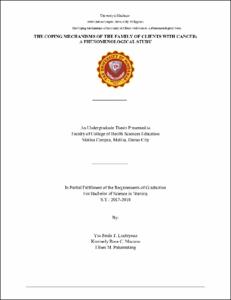| dc.contributor.advisor | GUYOT, MARY ANN B. R.N., M.N. | |
| dc.contributor.author | Lantayona, Ysa Paula | |
| dc.contributor.author | Macuno, Kimberley Rose C. | |
| dc.contributor.author | Pahamutang., Ellien M. | |
| dc.date.accessioned | 2023-01-27T05:35:26Z | |
| dc.date.available | 2023-01-27T05:35:26Z | |
| dc.date.issued | 2017 | |
| dc.identifier | 77711097 77712801 | en_US |
| dc.identifier.uri | http://103.123.43.47:8080/handle/20.500.14045/420 | |
| dc.description | In Partial Fulfillment of the Requirements for the Degree in Bachelor of Science in Nursing S.Y. 2018-2019 | en_US |
| dc.description.abstract | This study was conducted based on the high prevalence of cancer in Davao City and the researchers explored how the families kept up with the phenomenon. The researchers utilized qualitative descriptive type of research wherein it is all about comprehensive summarization, in everyday terms, of specific events experienced by an individual or groups, it involved fifteen (15) families with a family member with cancer in Davao City. In line with this, the significance of the study would be as follows: Firstly, the researchers will supplement the findings to the nurses giving care and treatments in cancer homes for them to be able to give adequate quality care. Secondly, the researchers will extend the understanding and knowledge of student nurses that are being exposed to patients with cancer. Third, the researchers will scrutinize how the families of client with cancer accepted the situation and to give them enlightenment and motivation to not lose hope because other families are struggling, too and they should continue fighting. Lastly, to the Cancer Institutes so that they can provide the appropriate and humanistic management and treatment for cancer patients. The findings of the study are as follows: worrying is most of the families’ reaction when they knew that a family member was diagnosed with cancer. Eating habits were altered, sleeping patterns, emotional disturbances, productivity at work and at home, as well as they were socio-economically challenged. Adaptive coping mechanism is most of the families’ method of accepting the situation, and majority of them were strongly decided to continue the treatment and are willing to support for the finances and the operations to be undergone. The researchers recommend the study for those concerned with regards to family coping with cancer. | en_US |
| dc.language | en | en_US |
| dc.rights | University of Mindanao LIC | en_US |
| dc.subject | Medical care -- Research. | en_US |
| dc.subject | Cancer -- Nursing -- Psychological aspects. | en_US |
| dc.title | The Coping Mechanisms of the Family of Clients With Cancer: A Phenomenological Study | en_US |
| dc.type | Thesis | en_US |
| dc.contributor.panel | ESPRA, AILEEN D. M.S., PhD | |
| dc.contributor.panel | MENDEZ, NORMA J. R.N., M.A.N. | |
| dc.contributor.panel | LARIEGO, OFELIA C. R.N., M.A.N. | |
| dc.publisher.src | COLLEGE OF HEALTH SCIENCE EDUCATION | en_US |
| dc.description.ddc | UDT 610.73 L29c 2017 | en_US |
| dc.description.xtnt | 35 leaves ; 30 cm. | en_US |
| dc.date.produced | 2017 | |

